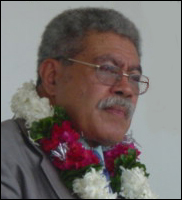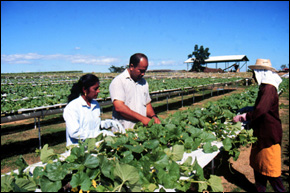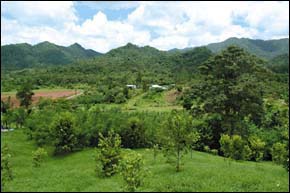 Fiji Sugar
Restructures for World Trade Fiji Sugar
Restructures for World Trade |
After years of being the backbone of Fiji's economy,
the country's sugar industry is in dire need of
re-structuring in order to avoid utter collapse.
Falling sugar quality, inefficient milling, and
expiring farm leases are factors that have been
eating away at the industry's efficiency and profitability.
As a member of the African, Caribbean and Pacific
bloc of nations, Fiji's sugar has benefited from
the special sugar prices the European Union has
been buying its sugar with. In 2001 for instance,
sugar receipts totalled $231.5 million FJD (@ $115.75m
USD). But under World Trade Organisation rules,
that special price, which is about three times more
than the world market price, will end in 2007. Already,
two sugar producing countries, Australia and Brazil,
have lodged protests with the WTO about the special
sugar price the EU offers ACP sugar producers like
Fiji. When he visited Fiji in October of 2002, EU's
Commissioner for Development Poul Nielson, had only
one advice for Fiji: "Re-structure the sugar
industry if it is to survive." The sugar
industry will continue to be of fundamental importance
to the Fiji economy. Cane occupies over 50 percent
of arable land and the industry directly employs
13 percent of the nation's labor force, contributing
around 9 percent of GDP and generating some 30 percent
of total domestic exports. But "the industry
is in serial troubles" admits Prime
Minister Laisenia Qarase, who personally wanted
to "supervise the restructuring process
of this industry. We are allocating substantial
resources in the 2003 Budget and that is only the
beginning of this reform process" explains
Prime Minister Qarase, "what we have in
this year's Budget will not be sufficient as the
restructuring process will take five years from
now." He said the budget allocation in
2003 aims to turn around Fiji's milling company,
the Fiji Sugar Corporation, from its current insolvent
situation to a sound and stable company. The government
has done this by putting $20 million FJD (@ $10m
USD) in equity and writing off $34 million (@ $17m
USD) in loans. These two measures will immediately
turn the company around into a viable operation,
Qarase hopes. "Beyond that, we will need
to look at the improvement of the transportation
system of the sugar cane to the mills. There is
also a need to look at the railway system that supports
the sugar industry and we will have to look too
at the size of the farms, some are very small and
we may have to amalgamate them. We also have to
look at the social implications that the restructuring
process will cause. I have appointed a Sugar Restructure
Steering Committee to work out the details and make
recommendations to the government for whatever is
needed to proceed correctly with this process."
The Prime Minister admits it will be a very painful
exercise for the whole of Fiji but the ultimate
objective is to ensure that Fiji becomes a very
efficient producer and a competitive supplier of
sugar in the world. "We have to be prepared
for the time when subsidies from the European Union
are eventually phased out," he says.

 Balancing
Land Tenure for Productive Use Balancing
Land Tenure for Productive Use |

|
While the restructure
aims to produce an efficient and competitive sugar
industry, the search has begun in Fiji for alternatives.
In the light of the proverbial saying of not putting
all your eggs in one basket, some economists feel
the restructuring exercise has been telling lessons
for the island economy: that the time is now for
investment into other equally lucrative cash crops.
At one time, there were hopes that kava, a traditional
drink in Fiji and many other island nations in the
Pacific, would develop into a multi-million dollar
industry with markets in North America and Europe.
However, the industry virtually collapsed over fears
that kava capsules have severe side-effect triggering
bans of the product in these countries. According
to Agricultural Minister Jonetani
Galuinadi, "In Fiji we have enormous
opportunities in the production of fresh fruits
including papaya, pineapple, processed fruit, ginger,
traditional root crops, such as dalo, coconut products
such as coconut cream, activated carbon, and organic
products, vegetables such as eggplants, cucurbits,
watermelon, rock melon, zucchini and certified organic
products which have 40% to 60% market premium depending
on the product." Mr. Galuinadi assures
"more emphasis will be placed on formation
of the farmers groups and co-operatives organized
by producers to drive most of these industries and
the role of Government is only to facilitate through
the provision of necessary infrastructure, technical
advice, market facilitation and research."
In Fiji, sugar and land are inter-related. This
stems largely from the fact that of the 30,000 cane
farmers, hardly any of them owns the land they till.
Under Fiji's land tenure system, the land belongs
to indigenous Fijian owners, administered on their
behalf by the Native
Land Trust Board (NLTB). More than 80 percent
of Fiji's arable land belongs to indigenous owners,
and classified as native land. The remaining 20
percent are either freehold or state-owned. Because
majority of cane farmers are non-Fijians, Indians
mainly, Fiji has to come up with a land tenure legislation.
During British colonial rule, Indian farmers were
leasing cane farm lands under ALTO, the Agricultural
Lands and Tenants Ordinances that offers 10 year
leases to farmers. When this expired in 1976, ALTA,
the Agricultural Lands and Tenants Act came into
being, giving farmers 30 year leases with land rental
fixed at 6 percent of unimproved capital value (UCV).
Leases under ALTA began expiring in 1997 and up
to 2002, a total of 4,221 leases have expired. Of
these, some 1,164 leases, about 28%, had been renewed.
For now, government together with the Native Land
Trust Board have to negotiate with representatives
of farmers a successor to ALTA. There are talks
of offering 50-year leases now, but at a slightly
higher rental from the 6% UCV rate offered under
ALTA. With the sugar industry supporting indirectly
and directly some 250,000 people and with the number
of sugar cane farmers dropping from 23,000 to 20,000,
the need to come up with a resolution to the land
lease problem cannot be over-emphasised. Prime Minister
Qarase and his government recognises this and has
formed a committee of stakeholders to provide solutions.

Mr. Kalivati Bakani, NLTB's
General Manager and member of the sugar restructuring
process steering committee, explains that "there
is inherent friction and conflict between the landowner
and the tenant farmer in the present set-up. In
theory the restructure will take that confrontation
point out because the individual farmer does not
need to face the landowner or the NLTB at that level."
Mr Bakani believes "this restructure will
bring commercialisation to the whole industry and
de-politicisation of the sugar sector. Once you
have the industry running on a commercial basis
everyone will get the benefits rather than all the
bickering that takes place now". Mr. Bakani
explains that "the basis of the ownership
is that land is owned by the mataqali (land owning
unit). It is not owned individually but communally.
When somebody wants to come in and set up a business
that involves land the first thing they should do
is to get in touch with the NLTB and depending on
the type of project we can advise them on what land
will be suitable for their purposes or even helping
them to contact landowners and facilitate the negotiations."
Mr. Bakani says that the NLTB is "the one
stop shop for people who want to make contact with
the landowners or set up a business on Native Land.
Only us have the right to lease the land."
|

